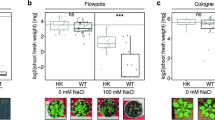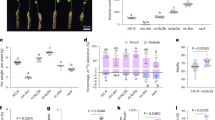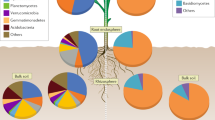Abstract
INVESTIGATIONS are being undertaken at this Station into local problems associated with the establishment of new pastures. Such pastures are commonly sown in the autumn following a summer crop of chou moellier (marrow stem kale), Brassica oleracea var. A frequent outcome of such sowings is that the grass components of the seeds mixture germinate and grow apparently normally, while the legume component may or may not germinate. If the seeds of the legume component (chiefly white clover) do germinate, and seedlings emerge, they frequently die off in four to six weeks.
This is a preview of subscription content, access via your institution
Access options
Subscribe to this journal
Receive 51 print issues and online access
$199.00 per year
only $3.90 per issue
Buy this article
- Purchase on Springer Link
- Instant access to full article PDF
Prices may be subject to local taxes which are calculated during checkout
Similar content being viewed by others
Author information
Authors and Affiliations
Rights and permissions
About this article
Cite this article
CAMPBELL, A. A Germination Inhibitor and Root-Growth Retarder in Chou Moellier (Brassica oleracea var.). Nature 183, 1263–1264 (1959). https://doi.org/10.1038/1831263a0
Issue Date:
DOI: https://doi.org/10.1038/1831263a0
This article is cited by
-
Hydrolysis products of glucosinolates in Brassica napus tissues as inhibitors of seed germination
Plant and Soil (1996)
-
Differential phytotoxicity among species and cultivars of the genusBrassica to wheat
Plant and Soil (1986)
-
Influence of ionic thiocyanate on growth of cabbage, bean, and tobacco
Journal of Chemical Ecology (1983)
-
Glucobrassicin a potential inhibitor of unusual type affecting the Germination and growth of plants; mechanism of its action
Biologia Plantarum (1964)
Comments
By submitting a comment you agree to abide by our Terms and Community Guidelines. If you find something abusive or that does not comply with our terms or guidelines please flag it as inappropriate.



